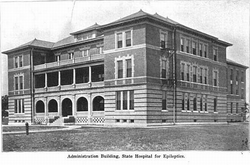Difference between revisions of "Parsons State Hospital"
M-Explorer (talk | contribs) (Created page with '{{infobox institution | name = Parsons State Hospital | image = Parsons1.png | image_size = 250px | alt = Parsons State Hospital | caption = | established = | construction_bega…') |
M-Explorer (talk | contribs) |
||
| (6 intermediate revisions by 3 users not shown) | |||
| Line 16: | Line 16: | ||
| location = | | location = | ||
| architecture_style = | | architecture_style = | ||
| − | | peak_patient_population = | + | | peak_patient_population = 1,006 in 1946<ref>source: [https://cdm16884.contentdm.oclc.org/digital/collection/p16884coll96/id/52/rec/2 https://cdm16884.contentdm.oclc.org/digital/collection/p16884coll96/id/52/rec/2]</ref> |
| − | | alternate_names = | + | | alternate_names =<br> |
| − | Parsons State Hospital and Training Center | + | *Parsons State Hospital and Training Center |
| − | State Hospital for Epileptics | + | *State Hospital for Epileptics |
}} | }} | ||
| + | ==History== | ||
The Hospital first opened in 1903 as a State Hospital for Epileptics. In 1957 the Hospital was renamed Parsons State Hospital and Training Center and began providing programs for individuals with mental retardation. The Hospital occupies 43 buildings on 163 acres. Major components include residential services, the University Center on Developmental Disabilities and the Parsons Research Center for the University of Kansas, the Special Purpose School of the Southeast Regional Education Service Center, and the Southeast Kansas Agricultural Research Center of Kansas State University. | The Hospital first opened in 1903 as a State Hospital for Epileptics. In 1957 the Hospital was renamed Parsons State Hospital and Training Center and began providing programs for individuals with mental retardation. The Hospital occupies 43 buildings on 163 acres. Major components include residential services, the University Center on Developmental Disabilities and the Parsons Research Center for the University of Kansas, the Special Purpose School of the Southeast Regional Education Service Center, and the Southeast Kansas Agricultural Research Center of Kansas State University. | ||
| Line 32: | Line 33: | ||
</gallery> | </gallery> | ||
| + | ==Cemetery== | ||
| + | The cemetery holds the remains of about 700-800 former patients. Most graves are marked with a metal tag with the patients name only. | ||
| + | |||
| + | == Links == | ||
| + | *[http://cdm16884.contentdm.oclc.org/cdm/search/collection/p16884coll96/searchterm/SR24-10/field/identi/mode/exact/conn/and/order/govern/ad/desc PSH&TC Newsletter, 2007-2015] | ||
| + | *[http://cdm16884.contentdm.oclc.org/cdm/search/collection/p16884coll96/searchterm/SR24-11/field/identi/mode/exact/conn/and/order/govern/ad/desc The Monthly Buzz: STAND Adult Self Advocacy Group Newsletter, 2010-2014] | ||
| + | |||
| + | == References == | ||
| + | <references/> | ||
| + | |||
| + | [[Category:Kansas]] | ||
[[Category:Active Institution]] | [[Category:Active Institution]] | ||
[[Category:Cottage Plan]] | [[Category:Cottage Plan]] | ||
| − | [[Category: | + | [[Category:Institution With A Cemetery]] |
Latest revision as of 10:34, 21 October 2024
| Parsons State Hospital | |
|---|---|
 | |
| Construction Began | 1903 |
| Current Status | Active |
| Building Style | Cottage Plan |
| Peak Patient Population | 1,006 in 1946[1] |
| Alternate Names |
|
History[edit]
The Hospital first opened in 1903 as a State Hospital for Epileptics. In 1957 the Hospital was renamed Parsons State Hospital and Training Center and began providing programs for individuals with mental retardation. The Hospital occupies 43 buildings on 163 acres. Major components include residential services, the University Center on Developmental Disabilities and the Parsons Research Center for the University of Kansas, the Special Purpose School of the Southeast Regional Education Service Center, and the Southeast Kansas Agricultural Research Center of Kansas State University.
Images of Parsons State Hospital[edit]
Main Image Gallery: Parsons State Hospital
Cemetery[edit]
The cemetery holds the remains of about 700-800 former patients. Most graves are marked with a metal tag with the patients name only.
Links[edit]
- PSH&TC Newsletter, 2007-2015
- The Monthly Buzz: STAND Adult Self Advocacy Group Newsletter, 2010-2014

